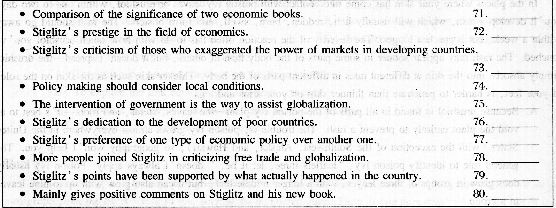
Part C
Answer Questions 71 -80 by referring to the following book reviews.
Note: Answer each question by choosing A, B, C or D and mark it on ANSWER SHEET 1. Some choicesmay be required more than once.
A = BOOK REVIEW 1B = BOOK REVIEW 2
C = BOOK REVIEW 3D = BOOK REVIEW 4
Which book review(s) contain(s) the following information?

The main point of the book is simple : globalization is not helping many poor countries. Incomes are not ris- ing in much of the world, and adoption of market-based policies such as open capital markets, free trade.
and privatization are makirlg developing economies less stable, not more. Instead of a bigger dose of free markets, Stiglitz argues, what' s needed to make globalization work better is more and smarter government intervention. While this has 'been said before, the ideas carry more weight coming from someone With Stiglitz's credentials. In some ways, this book ha—— the potential to be the liberal equivalent of Milton Friedman'S 1962 classic Capitalism and Freedom, which helped provide the intellectual foundafion for a generation of conservatives. But Giobalization and Its Discontents does not rise to the level of capitalism and freedom. While Stiglitz makes a strong case for govern- ment-oriented development policy, he ignores some key arguments in favor of the market. "The book' s main villain is the International Monetary Fund, the Washington organization that lends to troubled countries", Stiglitz' con- tempt for the IMF is boundless, "It is clear that the IMF has failed in its mission, " he declares. "Many of the poli- cies that the IMF pushed have contributed to global instability. "
While parts of this book are disappointingly shallow, Stiglitz' s critique of the market-driven 90' s s011 reso- hates; especially when the business page is full of stories about white-collar crime and the stock market
seems stuck in a perpetual rut. Even the United States cannot blithely assume that financial markets will work on au- topilot. It is testament to the salience of Stiglitz' s arguments that many economists--even some Bush Administration officials--now embrace his view that economic change in the developing word must evolve more with local condi- tions, not on Washington' s calendar. Without a thorough makeover, globalization could easily become a quagmire. Stiglitz shared a Nobel Prize last year for his work analyzing the imperfections of markets. His main c——omplaint a- gainst Rubin and Summers, who served as Treasury Secretaries, and against Fischer, the NO. 2 official and de facto chief executive of the international Monetary Fund, is that they had too much faith that markets could transform poor countries overnight. He labels these three men market fundamentalists, who fought tO maintain financial stability with the same urgency that an earlier generation struggled to contain communism. Worse, he suggests, they shilled for Wall Street, conflating the interests of the big banks with the financial health of the world.
"Stiglitz, 58, is hardly the first person to accuse the IMF of operating undemocratically and exacerbating T——ird World poverty. But he is by far the most prominent and his emergence as a critic marks an important
shift in the intellectual landscape. Only a few years ago, it was possible for pundits to claim that no mainstream e- conomist, certainly nobody of Stiglitz' s stature, took the criticism of free trade and globalization seriously. Such
claims are no longer credible, for Stiglitz is part of a small but growing group Of economists, sociologists and poliO- cal scientists, among them Dani Rodrik of Harvard and Robert Wade of the London School of Economics, who not
only take the critics seriously but warn that ignoring their concerns could have dire consequences. " Over the past several years, Stiglitz, a celebrated theorist who was awarded the 2001 Nobel Prize in economics for his work on asymmetric information, has grown accustomed to being at the center of controversy. From 1997 to 2000, he served as senior vice president and chief economist at the Word Bank--a tire that did not stop him from publicly criticizing the bank' s sister institution, the International Monetary Fund, Stiglitz' s outspokenness, unprecedented for a high- ranking insider, infuriated top officials at the IMF and US Treasury Department, and eventually led James Wolfen- sohn, the World Bank' s president, to inform him that he would have to mute his criticism or resign, Stiglitz chose to leave.
"Stiglitz' book makes a compelling case that simple-minded economic doctrine, inadequately tailored to the realities of developing countries, can do more harm than good, and that the subtleties of economic theory are actually quite important for sound policy advice, But simplistic political advice--give developing countries more voice and the institutions of global governance will be rendered more legitimate and efficient--is equally problemat- ic. Political reform is as subtle and.complex as economic reform. Evidently, the .best minds among us have only be- gun to think about it. " Joseph Stiglitz' s memoirs of his years in Washington, D. C. --first as chair of President blill Clinton' s Council of Economic Advisers and then as chief economist at the World Bank--have the flavor of a morality play: Our goodhearted but slightly native hero, on leave from Stanford University, sets out for the nation'
capital to serve his country and improve the lot of the developing world. Once there he finds a morass of political opportunism, ideologically motivated decision-making and bureaucratic inertia. Undeterred, he battles valiantly on behalf of impoverished nations against the unrelenting globalisers of the International Monetary Fund.

